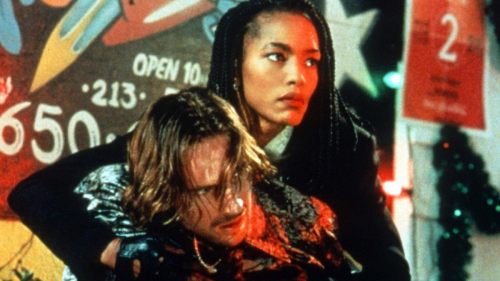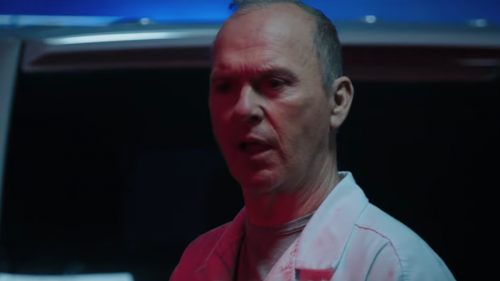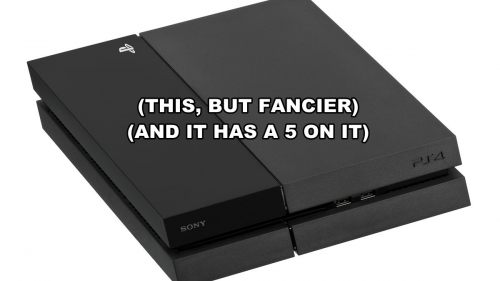Movie Review: ZERO DARK THIRTY Is Thrilling, Smart And Amazing
This is how it really happened.
Maybe it isn’t, but one of the greatest triumphs (and this is a movie that is just bursting with triumphs) of Zero Dark Thirty is that it feels authentic, true and correct. It’s the movie version of reading a great, in-depth magazine article, the kind that changes your thinking and gives you years of party small-talk. Kathryn Bigelow’s Zero Dark Thirty feels like journalism.
Can a narrative film be journalism? Can Truman Capote’s New Journalism work in the movies? That’s a good question to chew on in this age of neofactualist movies (think A Mighty Heart, The Road to Guantanamo, Green Zone), and if a narrative film can be journalism, Zero Dark Thirty is the film that proves it.
Informed by first hand research and interviews conducted by screenwriter Mark Boal, Zero Dark Thirty tells the inside story of the hunt to get Osama bin Laden, stretching from 2003 to the night when Seal Team Six loaded his corpse on a helicopter. It’s an enthralling bit of procedural storytelling that treats the audience like adults, that dares to demystify the shadowy world of intelligence and that presents the CIA’s role in the War on Terror in an even-handed, non-judgmental way.
Jessica Chastain is Maya, a CIA up-and-comer who finds herself stationed in Pakistan in the aftermath of the invasion of Afghanistan. She doesn’t want to be there, but she throws herself into the job, which includes torturing detainees who may have ties to Al Qaeda. The film is unblinking in its depiction of American torture, spending the first fifteen minutes with an Al Qaeda financier as he is beaten, sleep deprived, waterboarded and locked into a tiny box - and who resists giving actionable intelligence in advance of a terrorist attack.
But he does, when bluffed, give up a name. It’s the name of Osama bin Laden’s courier, and it’s the closest thing the CIA has to a lead in getting at the most famous terrorist in the world. Maya clings to that lead, even as it appears to go cold, hanging on for most of a decade, seeing it out to the very end. And as history tells us, she was right.
Chastain is astonishing as Maya. Zero Dark Thirty is a procedural, so there isn’t a moment spent with her that isn’t about her work in the War on Terror and the hunt for bin Laden, but Chastain creates a complete character between these scenes. Subtly, often just physically, she delineates a striking difference between the woman who shows up for her first day of work to see a man, strung up from the ceiling, shitting his pants and the woman who positively identifies the corpse of Osama bin Laden.
And when I say astonishing I mean it completely. For most of its (lengthy, unnoticed) running time Zero Dark Thirty does not feel like a movie, and much of that comes from Chastain’s restrained, real and deep performance. It doesn’t feel like a documentary either, but rather something right in the middle. It’s a complete immersion in reality, achieved without 48fps or 3D. It’s the exact same feeling you get when reading a great, absorbing book - the world falls away, the words become something concrete and tangible in your mind. Zero Dark Thirty is a movie that dissolves the theater and brings you into the immediacy of the moment, and a huge chunk of that comes from Chastain. Her Maya doesn’t tell you how she feels, but Chastain lets you into her mind and soul. It’s truly one of the performances of the year, a performance that doesn’t feel strained or mannered in any way.
The rest of the cast is excellent. It was only in the film’s last third that I remembered I was watching actors, and that’s just because very familiar faces like Mark Duplass, James Gandolfini and Chris Pratt show up (Kyle Chandler is running around the first half, but at this point I feel like Kyle Chandler in a movie is playing a concept - the basically good, often angry, distantly paternal figure - more than an actual character). Those faces make for some readjustment in accepting the reality on screen, but Bigelow handles it well. And she uses chameleon types like Mark Strong and Joel Edgerton in the truly key roles.
Chastain is obviously the standout, but the other performance I loved deeply came from Jason Clarke, playing CIA torture specialist Dan. Until this moment, when I checked his IMDB, I didn’t know Clarke was even Australian; I’ve seen him in other things but he never popped for me. Zero Dark Thirty is where he pops. He’s incredible: weary, smart, funny, casually cruel. The character of Dan seems to embody the madness of US policy post-9/11. He’s an educated guy, he’s a nice guy, he’s good at his job... and he also brutalizes detainees in order to get any scrap of information necessary.
This, I think, is where Zero Dark Thirty transcends into the all-timer category. The film presents these things, these uglinesses of this nebulous war, in a completely non-judgmental way. This is how it happened, the film says, and you get to decide for yourself if it was worth it. Some may argue that the film comes down on the side of the CIA - after all, it’s being told from their point of view, not Osama bin Laden’s - but I think that the movie’s actually much more viewpoint neutral. It’s Maya’s POV, not a nationalistic one, and by the end of the movie Maya has a very personal stake in the proceedings.
There’s that same understated ugliness in the raid on bin Laden’s compound (which, despite being recorded history whose outcome I knew well, plays with almost unbearable tension). Seal Team Six shooters casually put bullets through the hearts of downed enemies - men and women alike. The film doesn’t explain why, but it’s obvious - you can’t have this injured guy getting up and shooting you in the back. Bigelow and Boal treat the viewer like adults, never having a character say this, but they do play it like humans, and have characters - however briefly - express across their faces the impact of shooting a downed opponent. There are no histrionics, no moments of hesitation, no swelling strings. But it’s there. Subtly it’s there.
That casual ugliness is in service of something bigger. There’s an unspoken argument (so much in this film, by the way, is unspoken. It’s almost like Bigelow intended this as a movie for thinkers, not for Call of Duty: Modern Warfare thumb twitchers) that you have to bend your ethics for the bigger picture. It’s something that could fuel hours of post-film debate; I can see people walking out Zero Dark Thirty disgusted by the CIA’s actions, while others walk out energized, wanting to join the Agency. I found myself somewhere in the middle. I make no bones of the fact that I went out and celebrated the day bin Laden was killed. As a New Yorker, as someone personally and profoundly impacted by 9/11, I wanted that guy dead for a long, long time. Justice was meaningless in this case; just as Hitler rotting in jail wouldn’t have been any better justice than him dead, bin Laden’s capture would have only energized the failing radical elements in the Mideast. Yes, I felt vengeance sated when bin Laden died. Yes, I felt the same thing seeing Maya check his body bag at the end of this film; moved, and saddened and triumphant.
I think the film, very quietly, says that torture doesn’t work. The movie features four terror attacks/attempts, none of which were foiled by information extracted under duress. Even the name of bin Laden’s courier comes not from rough treatment but from basic, simple lying to the detainee (lying, to be fair, that is possible due to the detainee’s weakened state). It also shows how old school, Cold War spycraft is no longer applicable, though. It quickly becomes apparent that you cannot trust a fanatic. It's a movie about the scramble between paradigms, about the day-to-day attempt to make sense of a new world and America's place in it.
The fact that I can get this easily ‘off topic’ when discussing the movie is part of what thrills me about it. This is what a great movie does; it doesn’t just sit in the theater, entertaining you briefly before you move on to something else. It becomes part of you, burrowing into your brain and demanding constant attention. A great movie needs your brain turned on, because a great movie is looking to change the way you think. A great movie engages and stimulates and challenges you, and Zero Dark Thirty does all of those things.
It also thrills. Zero Dark Thirty is cerebral and journalistic, but that doesn’t make it boring. The character work, while nuanced, is engrossing. You don’t need to know about Maya’s whole background to understand who she is and to like her. You don’t need lots of character set up to care about the men in Seal Team Six. And you can know everything that happens in the film - the deaths, the triumphs, the horrors - and still be on the edge of your seat.
Bigelow merges a particularly Michael Mann vibe - the joy of watching professionals professionally execute their professional duties - into this factual story. There’s not a plodding moment. It’s electric from beginning to end.
It's worth taking a second (although it's a topic that deserves more discussion) to talk about Bigelow's gender and how it relates to this movie. At this point Bigelow has proven that, no matter what parts are between her legs, she can tell stories about men at war as well as, if not better than, anyone else. With Zero Dark Thirty she's telling a female story, but in a way that doesn't come across as feminist or pointed or making a statement. But that's the most feminist thing about it - Maya is the hero who brought bin Laden down, and the fact that she's a woman (and she's a woman, not a man in a woman's body. There's a wonderful scene where she's IMing with a friend and her messages are, without a doubt, coming from a feminine mind) is just there. It doesn't make her any less or more competent. Her abilities make her competent. But still, at the very end, when she's IDing bin Laden, the army liason refers to her as 'the girl.' It's a small thing, and Bigelow doesn't place an exclamation point on it, but here, in the moment where she has almost personally defeated America's bogeyman, she's still 'the girl.'
Can you tell this is a movie that blew me away? This is a film that elbows up against the boundaries of what we consider mainstream cinema. This is a film that doesn’t accept modern conventional thinking about what a military movie must be, about what a historical drama must be, about what an awards contender must be. This is a movie created completely on its own terms, forged by the belief that audiences can pay attention, that audiences don’t need everything spoonfed, that truth is just as exciting as fiction when presented well.
Zero Dark Thirty is an incredible achievement for Kathryn Bigelow, an enormous leap forward as a filmmaker. It’s a high water mark for 21st century mainstream filmmaking. It’s a movie that’s going to cast a warm glow on the rest of the year, the rest of the decade. If we could get one big budget movie a year as smart, as good, as ambitious as Zero Dark Thirty we’d be living in a new golden age of cinema.



